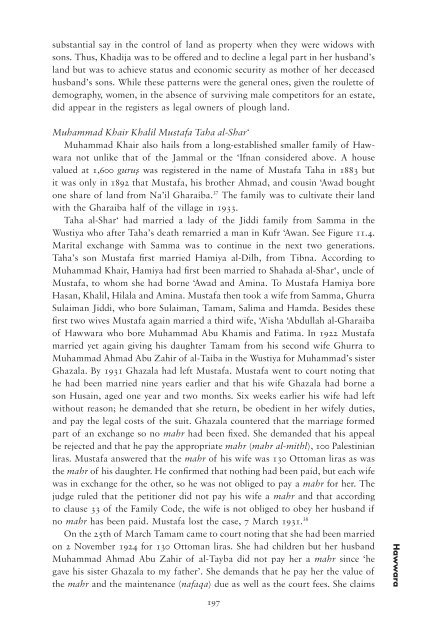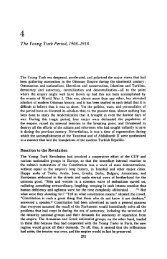Governing property, making the modern state - PSI424
Governing property, making the modern state - PSI424
Governing property, making the modern state - PSI424
You also want an ePaper? Increase the reach of your titles
YUMPU automatically turns print PDFs into web optimized ePapers that Google loves.
substantial say in <strong>the</strong> control of land as <strong>property</strong> when <strong>the</strong>y were widows with<br />
sons. Thus, Khadija was to be offered and to decline a legal part in her husband’s<br />
land but was to achieve status and economic security as mo<strong>the</strong>r of her deceased<br />
husband’s sons. While <strong>the</strong>se patterns were <strong>the</strong> general ones, given <strong>the</strong> roulette of<br />
demography, women, in <strong>the</strong> absence of surviving male competitors for an e<strong>state</strong>,<br />
did appear in <strong>the</strong> registers as legal owners of plough land.<br />
Muhammad Khair Khalil Mustafa Taha al-Shar‘<br />
Muhammad Khair also hails from a long-established smaller family of Hawwara<br />
not unlike that of <strong>the</strong> Jammal or <strong>the</strong> ‘Ifnan considered above. A house<br />
valued at 1,600 guruş was registered in <strong>the</strong> name of Mustafa Taha in 1883 but<br />
it was only in 1892 that Mustafa, his bro<strong>the</strong>r Ahmad, and cousin ‘Awad bought<br />
one share of land from Na’il Gharaiba. 37 The family was to cultivate <strong>the</strong>ir land<br />
with <strong>the</strong> Gharaiba half of <strong>the</strong> village in 1933.<br />
Taha al-Shar‘ had married a lady of <strong>the</strong> Jiddi family from Samma in <strong>the</strong><br />
Wustiya who after Taha’s death remarried a man in Kufr ‘Awan. See Figure 11.4.<br />
Marital exchange with Samma was to continue in <strong>the</strong> next two generations.<br />
Taha’s son Mustafa first married Hamiya al-Dilh, from Tibna. According to<br />
Muhammad Khair, Hamiya had first been married to Shahada al-Shar‘, uncle of<br />
Mustafa, to whom she had borne ‘Awad and Amina. To Mustafa Hamiya bore<br />
Hasan, Khalil, Hilala and Amina. Mustafa <strong>the</strong>n took a wife from Samma, Ghurra<br />
Sulaiman Jiddi, who bore Sulaiman, Tamam, Salima and Hamda. Besides <strong>the</strong>se<br />
first two wives Mustafa again married a third wife, ‘A’isha ‘Abdullah al-Gharaiba<br />
of Hawwara who bore Muhammad Abu Khamis and Fatima. In 1922 Mustafa<br />
married yet again giving his daughter Tamam from his second wife Ghurra to<br />
Muhammad Ahmad Abu Zahir of al-Taiba in <strong>the</strong> Wustiya for Muhammad’s sister<br />
Ghazala. By 1931 Ghazala had left Mustafa. Mustafa went to court noting that<br />
he had been married nine years earlier and that his wife Ghazala had borne a<br />
son Husain, aged one year and two months. Six weeks earlier his wife had left<br />
without reason; he demanded that she return, be obedient in her wifely duties,<br />
and pay <strong>the</strong> legal costs of <strong>the</strong> suit. Ghazala countered that <strong>the</strong> marriage formed<br />
part of an exchange so no mahr had been fixed. She demanded that his appeal<br />
be rejected and that he pay <strong>the</strong> appropriate mahr (mahr al-mithl), 100 Palestinian<br />
liras. Mustafa answered that <strong>the</strong> mahr of his wife was 130 Ottoman liras as was<br />
<strong>the</strong> mahr of his daughter. He confirmed that nothing had been paid, but each wife<br />
was in exchange for <strong>the</strong> o<strong>the</strong>r, so he was not obliged to pay a mahr for her. The<br />
judge ruled that <strong>the</strong> petitioner did not pay his wife a mahr and that according<br />
to clause 33 of <strong>the</strong> Family Code, <strong>the</strong> wife is not obliged to obey her husband if<br />
no mahr has been paid. Mustafa lost <strong>the</strong> case, 7 March 1931. 38<br />
On <strong>the</strong> 25th of March Tamam came to court noting that she had been married<br />
on 2 November 1924 for 130 Ottoman liras. She had children but her husband<br />
Muhammad Ahmad Abu Zahir of al-Tayba did not pay her a mahr since ‘he<br />
gave his sister Ghazala to my fa<strong>the</strong>r’. She demands that he pay her <strong>the</strong> value of<br />
<strong>the</strong> mahr and <strong>the</strong> maintenance (nafaqa) due as well as <strong>the</strong> court fees. She claims<br />
197<br />
Hawwara












